This post is comprised of different sections
Take a look at our review of Being John Malkovich!
Learn more about conscious experience!
This post is comprised of different sections
Take a look at our review of Being John Malkovich!
Learn more about conscious experience!
Director: Spike Jonze
Producer: Steve Golin, Vincent Landay, Sandy Stern, Michael Stipe
Writer: Charlie Kaufman
Starring: John Cusack, Cameron Diaz, Catherine Keener, John Malkovich
Year: 1999
Duration: 1h 52m
Country: USA
Language: English

Our rating

Your rating
What would it be like being in John Malkovich’s mind?
I bet many of you, at some point in your lives, have wondered what it would be like to step in someone else’s shoes and live his/her glamorous and (why not) debauchery life.
With the media constantly bombarding us with excerpts of the lavish lives of famous personalities, we often wonder how awesome it would be if we could live their lives even for a moment. Great car, great boyfriend/girlfriend, great house, great abs…
Hollywood has certainly worked hard to exploit this idea as many of its flicks will attest: Vice Versa (1988), The Hot Chick (2002), Scooby Doo (2002), Freaky Friday (2003), It’s a Boy Girl Thing (2006), The Change-Up (2011), The Swap (2016), Freaky (2020) and Family Switch (2023) just to name a few.
Unfortunately, most of these films reuse pretty much the same formulaic ideas and predictable jokes. But if one can say something about Being John Malkovich is that it is certainly unconventional.
Being John Malkovich tells the story of Craig Schwartz, an unemployed street puppeteer, who lives with his pet-obsessed wife Lotte Schwartz.
Craig lands a job as a file clerk at a bizarre firm located between the 7th and 8th floor of the Mertin-Flemmer building, ran by eccentric Dr. Lester. Craig meets Maxine Lund, an attractive but ruthless and manipulative co-worker with whom he becomes infatuated, but who doesn’t return Craig’s affections.
One day, Craig finds a hidden passage on a wall and decides to explore, only to realise the hole is actually a portal into John Malkovich’s mind. Yes, into the actual John Malkovich, who is playing a version of himself.
Maxine sees an opportunity to make quick cash and together with Craig start out a “business” that quickly gets out of hand. And much to the chagrin of Malkovich.
Being John Malkovich is definitely original, and I did appreciate the writer’s decision to stay away from corny swapping-body narratives. The story is unpredictable, it doesn’t fall prey to clichés, and it mixes sporadic light humour with some bizarre events.
However, I just had a really hard time figuring out where the heck the film was going. I mean what was really the point of the movie (if there was ever one), its message, so to speak? The impression I had was that the narrative consisted of loose bits and pieces put together, without really fitting each other.
Take the character Maxine, for example. First, when Craig first told her about his initial experience with the portal, she showed (reasonably) complete skepticism. Then, a few hours later she suddenly wanted to profit from Craig’s discovery, even though we have no idea what convinced her about Craig’s sketchy-sounded story. Moreover, for a character that was shown from the beginning to have a complete disregard for other people, who was manipulative, opportunistic and plain mean, her character has a sudden change of heart, in a way that I found too artificial and rushed.
In addition, there is an abundance of interesting themes (e.g., consciousness, self, gender identity, love obsession), but all of them are dealt in a very superficial way.
Setting aside Dr. Lester’s clear explanation regarding the mechanism behind the possession of new vessels, I couldn’t help but feel a sense of dissatisfaction for the lack of proper treatment of some other crucial aspects of the story. For example, Craig brings up interesting and relevant points about the philosophical implications of the portal into Malkovich’s mind, but ends his monologue in a very shallow and trivial manner: “I don’t see how I could go on living my life the way I’ve lived before”. After that, there is no attempt, by any of the characters, to explore the significance of this portal.
Of course, the writers probably did not wish to reveal too much and to leave some mystery in the story, but I felt that mystery was misplaced. It was simply too frustrating for me that no one questioned why on Earth the hole exists, and why are you dumped on New Jersey Turnpike and not on Central Park, for example? What’s so special about that place? Aren’t Craig, Maxine and Lotte worried that they may have themselves a portal? Likely, the writers did not wish to get bogged down in these kinds of detail, but simply ignoring these questions lowered the quality of the film, in my opinion.
On a more positive note, I did feel the casting was just right. Catherine Keener was fearless in her portrayal of Maxine, and it was interesting to see John Cusack playing a nerdy, dependable and troubled Craig. Cameron Diaz was perhaps the least surprising of the lot, since Lotte’s labile nature is something we can observe in some characters that Diaz played in previous films.
However, most of the credit really must go to John Malkovich. It’s amazing how they managed to convince Malkovich to play a version of himself in a script that doesn’t really portray him in a good light. Not only is his character regularly mocked and ridiculed (e.g., “Who the f**k is John Malkovich?“, “The one where you played a jewel thief“; “Shut up, you overrated sack of s**t!“; “Little Johny Malk-o-pee“, etc.), manipulated by Maxine, but also, and without wishing to reveal too much, meets a very disturbing end.
Brave, very brave!
Being John Malkovich might be worth watching for the entertaining aspect of it. However, ultimately, the movie might leave many viewers underwhelmed, mostly by a vacillating story progression, but also by a poor treatment of crucial elements that would make the story more sound (e.g., why does the hole exist? Why John Malkovich? Where does the body go? Are there other holes?).
Not a big fan I’m afraid, so here, at Mindlybiz, Being John Malkovich gets a rating of 2.
Being John Malkovich is slightly bizarre. Actually, absurd would be a more adequate adjective, if I’m allowed to be semantically pedantic.
The movie often gets the label of surrealistic, but I’m not sure that’s an accurate label. The reason is that the narrative in itself is not strange at all. There isn’t covert symbolism that I could recognise, there aren’t events in the story that will leave you utterly perplexed, like those in what I consider truly surrealistic movies (e.g., Jodorowsky’s “The Holy Mountain”).
The bizarre scenes, such as the tiny ceilings, are far and between, and the voyage into John Malkovich’s head could be categorized more as science fiction/fantasy rather than surrealism.
Being John Malkovich gets a Bizarrometer score of 1.
Craig’s accidental discovery of the portal inside the Mertin-Flemmer building, leads him inside the mind of actor John Malkovich. For 15 minutes he sees the world through Malkovich’s eyes as the latter goes about his usual life, before being dumped on a ditch on the side of the New Jersey Turnpike.
Craig lets his wife, Lotte, in the secret, who becomes obsessed about getting into Malkovich’s mind; her experience later becoming the vehicle for the voyeuristic relationship with her lover Maxine.
The question is, of course, are Craig and Lotte being John Malkovich, in the sense that they are experiencing what it is like being Malkovich, feeling his subjective sensations? The answer is a resounding no.
As we will see shortly, subjective experiences (also called qualia) are unique to each individual. Somehow, Craig and Lotte retain their own consciousness and memories when inside Malkovich’s mind, suggesting that the mind is separate from the body (at least, in the movie). Thus, their minds are but external observers, seeing through the eyes of Malkovich, but never feeling what Malkovich is actually feeling.
Leveraging on his puppeteering skills, Craig manages to gain full control of Malkovich’s body, relegating Malkovich’s mind to the subconscious. Where is Craig’s body when he takes over Malkovich’s? It’s not clear, but given the movie’s strong dualist undertones, Craig’s body may have simply separated from his mind, being stuck somewhere inside the portal, the inside of which likely resides in some hyperdimension.
Dr. Lester, who is in fact Captain Mertin, has found a way to live eternally by jumping from vessel to vessel using the portal. John Malkovich is to be his next vessel body when Malkovich turns 44 years old, but Craig’s total possession of Malkovich’s body meant that Craig had become too dominant to be forcefully expelled.
After Dr. Lester kidnaps Maxine and blackmails Craig, the latter willingly leaves Malkovich’s body, just in time to allow Dr. Lester and friends to replace Malkovich’s consciousness with their own consciousness. Malkovich’s mind is relegated to the subconscious forever.
Maxine and Malkovich’s daughter, Emily, became the next vessel, possibly because once the mind of the current vessel is taken over on its 44th birthday (in this case, Malkovich), then the portal is reassigned to the mind of the previous vessel’s offspring (i.e., Emily). Had Dr. Lester failed to enter by Malkovich’s 44th birthday, or had Malkovich had no children, then the portal would simply be reassigned to the next baby that just happened to be born at that time.
Consciousness is a big theme in the film, so let’s get started with a very brief discussion of what consciousness is.
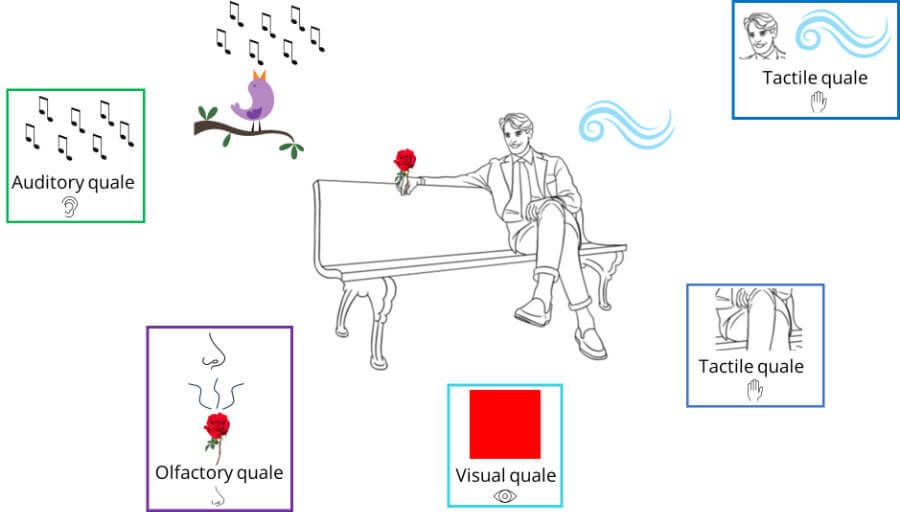
In all honesty, the field of philosophy is riddled with overly complicated jargon that only philosophers appear to appreciate: epistemological pluralism, collectivist perspectivism, deontological ethics, metaphysical idealism… You name it. Throw in borrowed German words such as: Ding an sich, Übermensch, Aufhebung, Zeitgeist, and no wonder philosophical texts look all Greek to us!
There is, however, one philosophical domain that is very relevant to the analysis of “Being John Malkovich” so it might be worth to remember: phenomenology.
Succinctly put, phenomenology is the studying of conscious experiences as we experience them from a first-person perspective.
Let’s imagine I’m sitting on a bench, looking at a red rose, thinking about how to explain what phenomenology is, feeling the wind on my face and hearing the birds chirping.
Now, this phenomenological experience can be decomposed into separate, elementary properties, known as qualia (singular: quale). So, the quale of the red colour of the rose is the subjective sensation of seeing red. The texture of the rose petals or the way my buttocks feel while sitting on the bench are tactile qualia; the sound of the birds is an auditory quale, etc. All of these qualia are the properties of my current phenomenological (conscious) experience.

The qualia are unique to each individual; when I have a subjective experience of something, the qualia of that experience can only be experienced by me. Even if you are looking at the same red rose, what “red” feels to me might be different from what “red” feels to you (for example, I might perceive it as slightly brighter, more pleasant, etc.).
Furthermore, even if I can describe my qualia to you in the most detailed way possible, that alone isn’t sufficient for you to know my own subjective experience.
Now, reductive physicalists (to introduce yet another jargon term) argue that everything can be reduced to physical phenomena. They argue that maybe we cannot yet completely explain consciousness because our experimental tools are still too crude, but we might eventually be able to do it in the distant future.
Thus, physicalists believe that consciousness, just like any other product of the mind, can be reduced to properties of the physical brain (neuronal firing, chemical interactions among neurons, inter-areal communication, etc).
But…

What a weird question for a title!!
Yes, it is weird. But it just so happens to be at the center of a great debate, if not the most exciting debate, in the entire field of cognitive science: the hard problem of consciousness.
The very same question in the title above was also the title of a 1974 paper by American philosopher Thomas Nagel. Basically, it deals with the tricky question of what it means to have subjective conscious experiences, and how a physical substance, such as the brain, can give rise to these subjective conscious experiences.
Nagel criticised physicalists’ position that consciousness is ultimately physical. To Nagel, consciousness isn’t something tangible that we can objectively measure with scientific tools, which is what physicalists attempt to do. He argued that, by trying to measure something objectively, we are removing subjectiveness from the equation. If there is no “subjective” in subjective experience, then physicalists cannot explain those experiences.
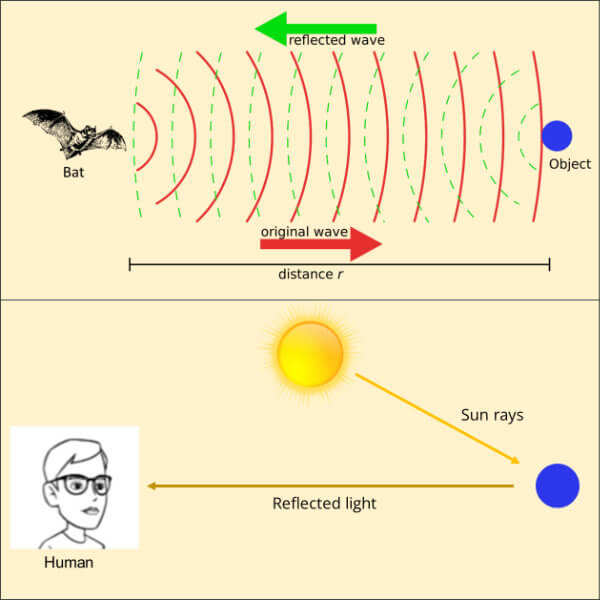
Nagel famously defined consciousness as “the feeling of what it is like to be something”. He reasoned that it’s likely that not every living being is conscious, but he felt that bats probably are. Bats are mammals, just like us, but unlike us, see the world in a very different way.
For starters, whereas humans are diurnal and rely on sight to navigate the world, (most) bats are nocturnal with relatively poor eyesight, relying instead on echolocation to find food and avoid obstacles.
He goes on to argue that we can never really know what it is like to be a bat, just as we will never be able to truly experience the what it is like to be someone else. In fact, we will not be able to experience anything in itself. So studying the subjective experiences with objective methods is simply impossible according to Nagel.

You might counterargue and say that you can imagine how a bat must feel like. For example, if you’ve already done skydiving or bungee jumping, you may have an idea of what flying probably feels like. Also, even though you cannot echolocate, you can imagine throwing a series of objects and if they ricochet and hit you, you know there is a wall in front of you.
But herein lies the problem. You are experiencing these things from the perspective of a human. No matter how sophisticated your experiences are, and how well you describe them, you are experiencing them and describing them from your point of view. You still cannot know exactly what it feels like to be the bat (i.e., the bat’s qualia), because those qualia are simply inaccessible to you.
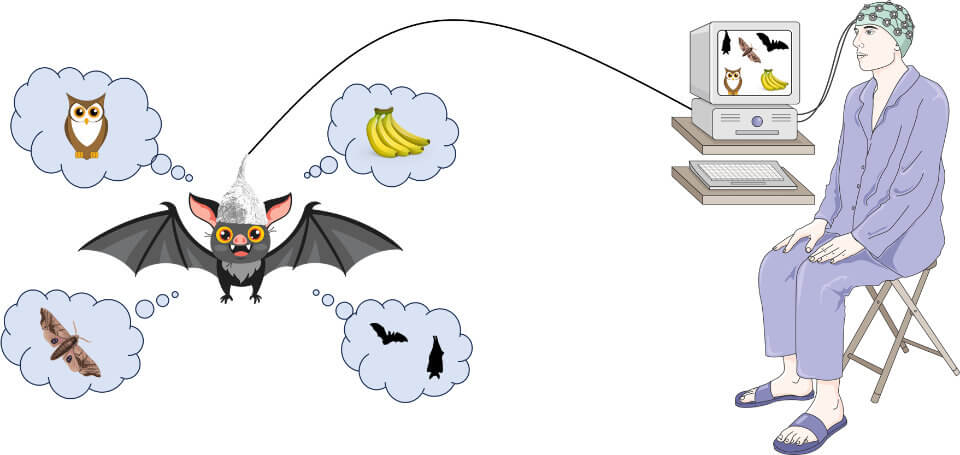
One could even potentially bring up the argument that in the future we might be able to build a sophisticated machine that would be capable of analysing the bat’s neural circuitry while conscious, generate its qualia, and insert them into your brain. Then, surely, you would feel what it is like to be a bat, right?
Well, not really.

Clearly, your brain isn’t wired as a bat’s brain, so even if you were to be injected with the bat’s qualia, would you really experience things like a true bat?
First of all, wouldn’t we need the same neural machinery as the bat, in order to reproduce the bat’s qualia? If so, that would surely mean that our brains required a replica of the bat’s brain from which the qualia had been extracted.
Think of it like the difference between a cassette tape and a cd (see figure above). We can store the same music in both mediums, but we can never play the tape on a cd player. We might have an approximation of what the cassette tape might sound like on a cassette player (the frequency response, the distortions, the dynamic range, etc.), but we cannot really reproduce the exact same sound on the cd player. No matter how imperceptible to the human ear, there will always be minute changes during the conversion.
Likewise, even if we had access to the exact neural circuitry of a bat’s qualia down to the synaptic firing, without the bat’s neural apparatus it would be impossible to really feel like the bat.
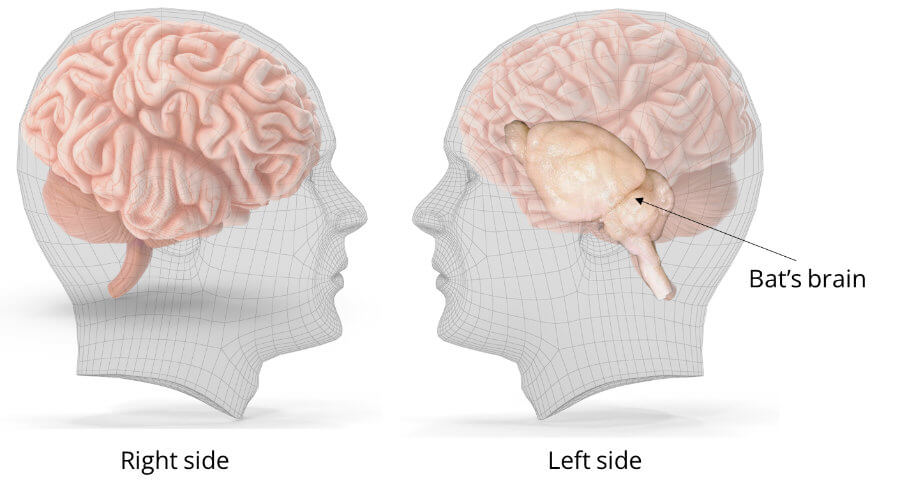
Even if we ignore the hardware problem, would you be able to feel what it is like to be a bat, while still being aware that it is you who is experiencing the bat’s feelings? If you are not aware that you are you, would you have memories of what it was like to be a bat once you came back to your own self? If you didn’t have any memories of it, how would you know what it felt like to be a bat?
Let’s now consider a situation in which a mad scientist developed a medical procedure that could transplant a bat’s brain into a human, with the human’s and bat’s brains somehow connected to each other. Thus, one could experience what being a bat feels like, and also be conscious of that experience as a human.
Setting aside the creepiness of this scenario, Nagel would probably still argue that this isn’t the same as what the bat is feeling. Surely, the consciousness from the human brain interacts with the consciousness of the bat’s brain, a component which is not present in the original bat.
Thus, because you are adding extra sensorial elements to your experience (the brains must be connected somehow), it cannot be argued that you know what it really feels like to be a bat.
Not easy stuff, right?
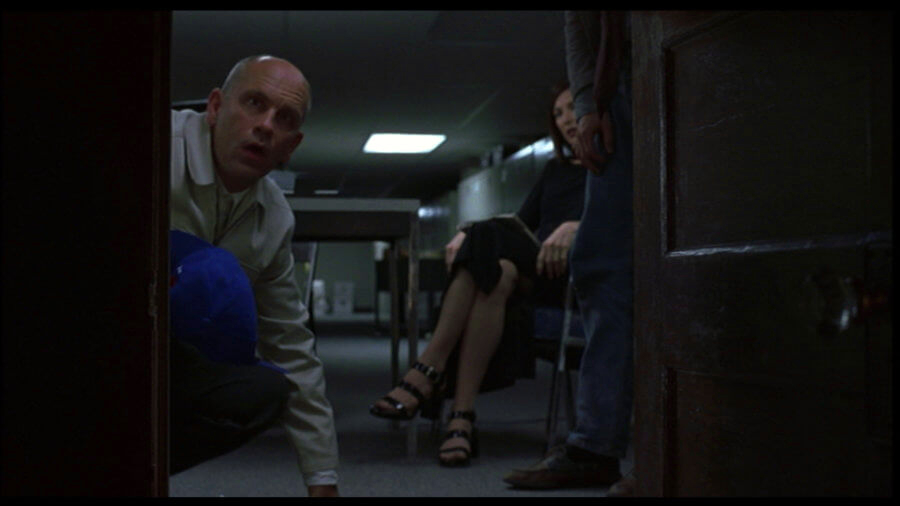
As mentioned in the Bizarrometer section, the film isn’t difficult to understand. Even though it is often labeled as surrealist, there are no WTF moments or any weird twists that will leave you scratching your head.
So, let’s go over a few questions which I think are interesting in for the discussion of subjective consciousness.

In the late 1800s, Captain James Mertin, an Irish immigrant came to the US and discovered a portal that happened to be the entrance to a vessel body. By going from vessel to vessel via the portal, Captain Mertin has managed to live eternally. Craig’s boss at the firm, Dr. Lester, is the latest vessel.
During the events of the movie, the portal leads into the mind of Malkovich. On his 44th birthday, Malkovich will become “ripe”, that is, his mind will be suitable to be controlled. However, Dr. Lester must enter the portal by midnight on Malkovich’s birthday. If he happens to be late, he will get diverted into the next baby that just happened to have been born at that time.
If that were to happened Dr. Lester would be absorbed (or trapped) in the host’s brain with no control over the host’s body. As Dr. Lester explained Lotte, “forever doomed to watch the world through someone else’s eyes”.
If people attempt to enter the portal before the vessel is ripe, they get spit out after 15 minutes have elapsed, and land on a ditch on the side of the New Jersey Turnpike (Craig was an exception, because he found out how to control Malkovich’s body and prevent being expelled; see below).
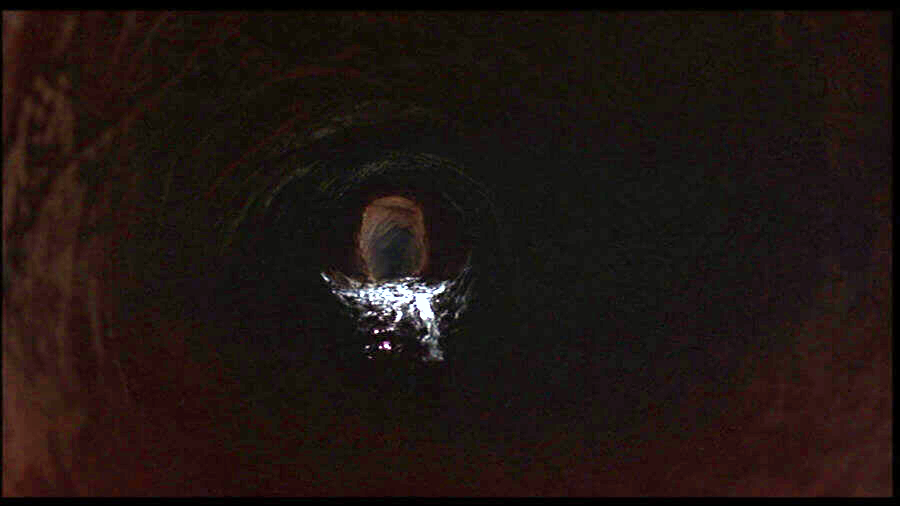
An interesting question is, how does it really work? Where is Craig’s body while inside Malkovich’s mind? How is it that Craig has his own qualia, despite being in Malkovich’s brain?
Good questions! But insufficient data to answer them!
At no point in the film is any of these questions considered. While talking to Maxine, Craig says “[…] it raises all sorts of philosophical-type questions about the nature of self, about the existence of a soul. You know, am I me? Is Malkovich Malkovich?”.
That’s it! That’s all the treatment we get about the metaphysical relevance of the portal (this is, actually, one of the major reasons I gave this film only 2 stars).
Speculatively, we could take on an extreme dualist account of mind-body, and imagine that the mind resides a realm which is completely dissociated from the physical world in which the body inhabits. Moreover, this mind would be capable of holding multiple minds, all coexisting next to each other.
So, the physical body, and by extension the physical brain, is Malkovich’s. When Craig is inside the tunnel, his body ceases to exist in this world, but his mind exists in the “mind realm” embedded within Malkovich’s mind.
That is why, in the end, Lester and his friends are all able to get into Malkovich’s mind. There doesn’t seem to be a limit on the amount of minds that a body can contain, again, suggesting a dualist separation of mind-body.
Whether all of these minds have the same degree of control and awareness of Malkovich’s body is a different question.
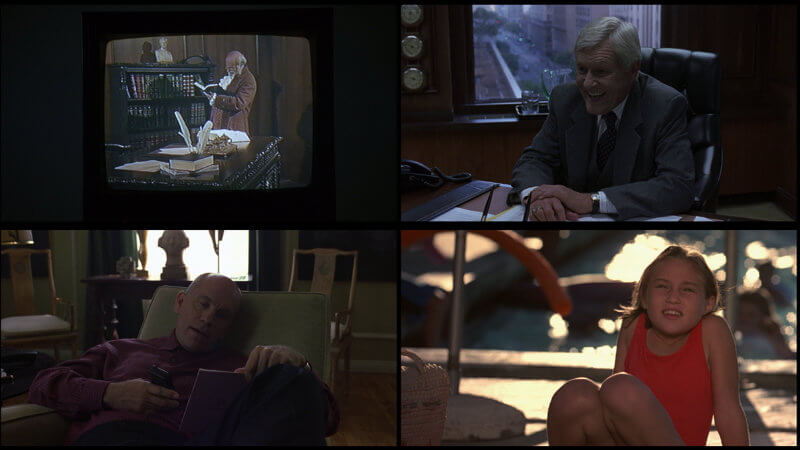
It isn’t clear how the portal came to be the entrance to Malkovich’s mind. Since Maxine’s and Malkovich’s daughter will become the next vessel after Malkovich, it suggests that the portal has a genetic component. In other words, the offspring of the previous vessel will become future vessels. This, however, doesn’t make much sense since that would imply that Dr. Lester was somehow related to Malkovich (since Dr. Lester is the current vessel), and they don’t appear to be related at all.
One could say it was a huge coincidence that the daughter became the vessel, and that would be it. However, Dr. Lester knew that Maxine’s daughter would be the next vessel before she was born, so it would appear that Captain Mertin has some control over which vessel body he wants to choose.
Alternatively, perhaps the offspring of the to-be-vessel (Malkovich) will automatically become the subsequent vessel (Malkovich’s daughter). In cases in which the to-be-vessel did not have any children, then perhaps one is designated at random. Dr. Lester does not appear to have children, so Malkovich just happened to be one of the random babies to whose mind the portal was assigned to.
An interesting afterthought is what will happen if the to-be vessel dies before he/she turns 44 and had no children? In that case, we can speculate that if the mind is really separate from the body, then it might get transferred to the mind of a baby that just happened to be born at the time of the vessel’s death.
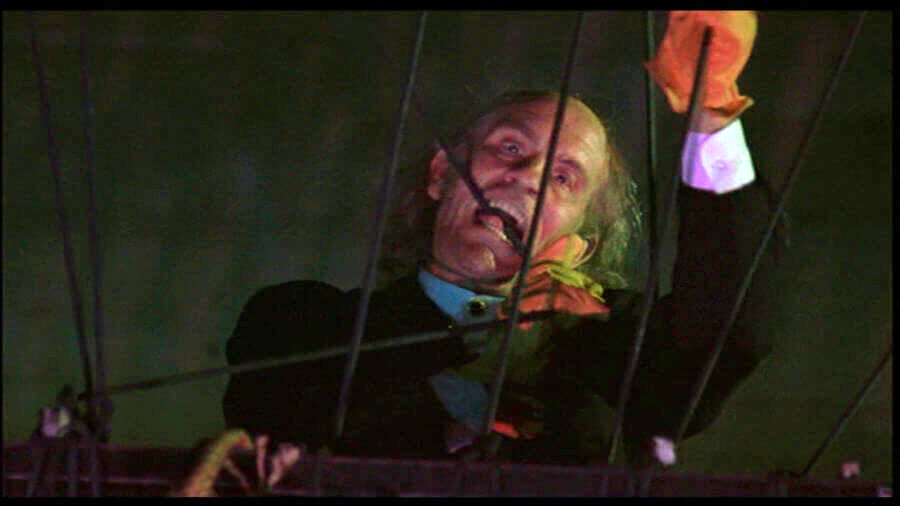
In the film, Craig finds the portal into Malkovich’s mind. The first time he goes down the portal, he is essentially a spectator seeing the world through Malkovich’s eyes.
If you read the section on qualia, you might be wondering, is Craig really being John Malkovich, in the sense that he experiences life as Malkovich is experience it?
The answer is clearly no.
Craig is fully aware of his own consciousness. Being in John Malkovich’s mind doesn’t eliminate his qualia (his subjective experiences) or his memories.
So, does John Malkovich stop being John Malkovich. Well, no… at least not at this point. Malkovich doesn’t have a seizure when Craig (or the other people) enters the first time. He looks calmy into a mirror or continues reading his newspaper, and goes about his life as usual.
This suggests that Craig entered a part of Malkovich’s consciousness without yet interacting with it. He observes, he even has physical sensations, but he doesn’t experience Malkovich’s qualia. Craig has his own qualia, John Malkovich’s has his own qualia.

For some reason, Lotte’s experiences were more extreme than Craig’s, as getting into John Malkovich’s mind turned into an obsession for her. She claimed that being inside changed her, that she found herself and everything made sense to the point that she wants sexual reassignment surgery. When Lotte comes to Lester’s house she even says “what is this strange power that Malkovich exudes? […] All I think about is wanting to be him”.
The question is whether Lotte is really feeling what Malkovich himself is feeling, as some interpretations I have read suggest, or whether she is simply turned on by seeing Malkovich as an external observer.
In Lotte’s first visit, Malkovich is taking a shower and it appears as though Lotte may be experiencing Malkovich’s sensations. What’s more, when Maxine and Malkovich have sex and Lotte is inside Malkovich’s head, after they finish we see Lotte lying on the ground completely sweaty, as if she was the one who had had sex.
But I’m not convinced. I think Lotte is simply ecstatic by the fact she is seeing the world from a man’s view (which, incidentally, triggers her decision to do the sexual reassignment surgery).
Remember the discussion on qualia? We cannot experience the qualia of other people, they are private, regardless of whether you could potentially “observe” the inside of someone’s mind. For Lotte to experience Malkovich’s qualia, then she necessarily would have to be Malkovich.

OK, this has to be one of the most bizarre scenes in the history of the cinema. When Malkovich finds out about the portal, he demands to get in. Once he does, he is confronted with all kinds of Malkoviches (woman Malkovich, waiter Malkovich, singer Malkovich, gay Malkovich, old Malkovich, etc.). They can only mutter one word: Malkovich.
I interpret this scene as Malkovich seeing his own subconscious. Let’s ask us the question, what if we could delve into our own subconscious mind, what would we see, and how it would work? It’s an unfathomable question by the way, but let’s .
Take a look at the figure on the right above. It’s safe to assume that if you peered into your own subconscious, the neural machinery that activated your subconscious somehow needed access to the neural machinery that makes you conscious of it (so that you can be conscious of your subconscious, if you know what I mean).
But, if it is your consciousness that activates your subconscious, and to be aware of your subconscious you need to activate consciousness, you are basically stuck in an endless loop!
And just like a computer programming infinite loop that never ends unless some external source aborts the sequence, in the case of Malkovich, that trigger was the 15 minutes elapsed time.
This is how I understood this scene. By diving into his own subconscious, Malkovich experiences all sorts of strange unconscious images, desires, fears, which are all transformed into Malkovich, since it is he who is looking inside his own mind.
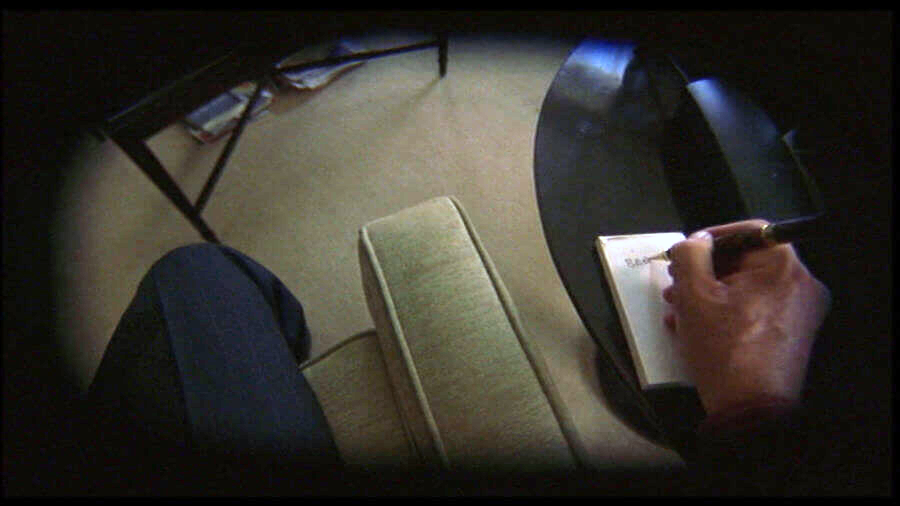
After Lotte’s second visit to Malkovich’s mind, Maxine calls Malkovich and asks him to meet her at a restaurant. Malkovich shows little interest and hangs up. However, inside his head, Lotte eggs him on, which spikes Malkovich’s curiosity and makes him decide to meet Maxine.
It is, at this point, that we realise that somehow Lotte was able to influence Malkovich’s decisions. But where does this influence come from?
I believe these influences are unconscious influences on Malkovich conscious behaviour. Lotte is, unwittingly, sending unconscious messages that are interpreted as curiosity by Malkovich’s conscious mind, which directly affects his decision making (if you are interested in this implicit phenomenon check out the section on implicit memory from the Memento article).
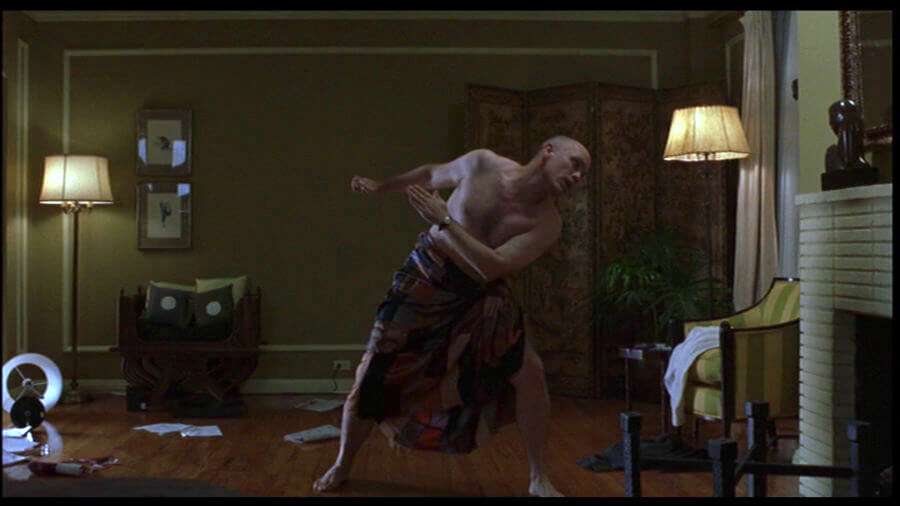
At some point in the film, Craig realises he can actually control Malkovich decisions and even body movements.
This happens when Maxine and Malkovich are having sex and Craig wants Malkovich to touch Maxine’s breast so he whispers to himself “Move right hand across left breast now”, to which Malkovich promptly obeys.
But note how this confuses Malkovich. He has no idea what has just happened to him during those moments Craig took over his consciousness. This suggests two things: First, that Craig can control Malkovich’s consciousness, and, second, that Malkovich’s consciousness is somehow pushed back, but not eliminated.
Later in the movie, Craig is able to completely take over Malkovich’s mind, replacing Malkovich’s qualia with his own. Now, Malkovich consciousness has been sort of suspended – it is not gone. As soon as Craig willingly left Malkovich, Malkovich returned to his senses and said “I’m free! I’m back!”. This suggests that Malkovich is aware that his consciousness had somehow been in a suspended state, even though it isn’t clear if he was aware of ever being Craig. Maybe he was a spectator, much like Craig was during his first visit to Malkovich’s mind.
The take here is that there can only be one conscious mind operating at any time point – either Craig’s or Malkovich’s, whereas multiple unconscious minds can exist simultaneously.
Craig, in Malkovich, tells Maxine that the way he can control Malkovich’s body is by “befriending” it, instead of trying to force it to do what Craig wants. He says the way to befriend it, is by imagining it as an expensive suit that Craig enjoys wearing.
Once Craig achieved this level of control, nobody could throw him out. Lotte thought they could get in while Craig was inside Malkovich’s head, but Lester told her that Craig would simply push them down into Malkovich’s subconscious.
This actually happened to both Lotte and Maxine, as the former tried to kill the latter, and both got into the portal while Craig was still inside. They could see many embarrassing moments from Malkovich’s childhood and teenage years that probably got buried in Malkovich’s unconscious.

When Lotte threatened Maxine with a gun, she ran into the portal and we hear Lester shouting that she cannot kill Maxine because she is carrying Malkovich’s baby, who is going to be his next vessel.
Then 7 years later, Malkovich invites Charlie Sheen to his house, and lets him in the secret of the portal and, by extension, of eternal life. They enter a room where pictures of Maxine’s daughter, Emily, are hanging on the wall.
Then, at a swimming pool, Emily is looking at Maxine and Lotte who are now together as a couple raising Emily. We realise that Craig is living inside Emily’s mind. However, he has absolutely no control over her. He keeps asking her to look away, but she keeps her gaze on them until the credits scene, suggesting that she is not aware that Craig is living in her subconscious mind.
What this suggests is that after realizing Maxine was alive but left him for Lotte, Craig eventually entered the portal (which is now Emily’s mind). However, Lester once told Lotte that if you get in the mind of a baby, you will get absorbed, forever trapped in the person’s mind, unable to control anything, and watch the world as a mere spectator. Forever!
Jeez, what a terrible fate!
The title Being John Malkovich is actually something of a misnomer.
The portal to Malkovich’s mind allowed Craig and Lotte to experience life as seen through the eyes of Malkovich, but they weren’t really being John Malkovich. Whoever entered Malkovich’s mind retained his/her own qualia, or subjective experiences.
Craig, however, stepped up his game, and actually succeeded in taking over Malkovich’s body using his puppeteering skills, relegating Malkovich’s mind to the subconscious. However, wanting to save his wife Maxine, Craig leaves Malkovich’s body on his 44th birthday, allowing Dr. Lester and company to take over Malkovich’s mind forever.
Maxine’s daughter, Emily, became the next vessel, likely because she was also Malkovich’s daughter, and the portal is immediately reassigned to the mind of the vessel’s offspring.
Craig meets a ghastly ending. Wanting to repossess Malkovich’s mind after being rejected by Maxine, he unwittingly entered the mind of Emily, sentencing him to be a prisoner in her mind for the rest of his, or should we rather say her, days.
Being John Malkovich is the first of a series of articles I intend to write about consciousness, one of my favourite topics in the fields of philosophy and neuroscience.
There are now innumerable theories of consciousness, and this article only skimmed through a few (debatable) aspects of a really complex and poorly understood phenomenon.
Being John Malkovich did, however, spike my interest in exploring concepts such as: What is nature of consciousness? Do we have free will? What defines one’s identity? Can we ever experience other’s subjective feelings?
But I’m way jumping the gun here. But I can’t help it, this is so damn interesting! 😀
See you in the next article!
Leave a comment
Add Your Recommendations
Popular Tags